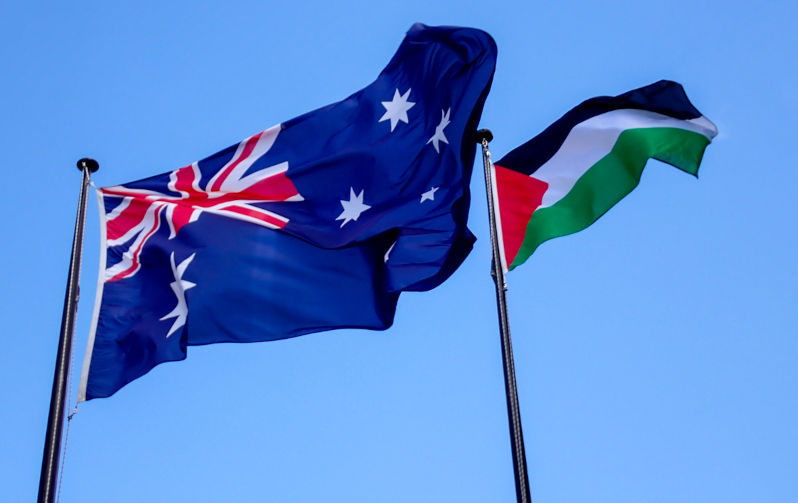The sham of Australia's recognition of Palestine: Hope, but light on glory
August 14, 2025
Australia’s recognition of Palestine, like that of other Western countries, is a step in the right direction, but it remains a sham.
The key phrase making the declaration a sham is the demand that recognition is conditional upon Hamas having no part to play in a new Palestinian state. Prime Minister Albanese said the outcome would be achieved because “we can stop them standing, let alone be elected".
The Australian stance on the exclusion of Hamas echoes the position taken by France, the UK and Canada. For these nations also, the recognition of Palestine is a sham.
Only Australian Minister for Home Affairs Tony Burke recognises the Australian declaration is a sham whose primary objective is to diffuse the sentiments expressed by the estimated 90,000 protesters who crossed the Sydney Harbour bridge.
The demand for the exclusion of Hamas is the poison pill. Had the same demand been made of the African National Congress after the collapse of apartheid, then the world-revered Nelson Mandela would never have become president of South Africa.
Meeting this demand in Ireland would have meant that Gerry Adams, a known and wanted terrorist leader, would never have been allowed to stand for parliament. The Easter Accords, ending decades of terrorism and occupation, would never have proceeded.
Perhaps it was this recent Irish history that Burke referred to when he said Australia has recognised other nations in the past even while under partial terrorist control.
Shadow Home Affairs minister Andrew Hastie also said the prospect of a two-state solution that excluded Hamas was “deeply unrealistic”.
Reach back 80 years to the defeat of Nazi Germany. Political reconstruction was only made possible when the allies accepted the claim from the local and provincial administrators and political leaders that they were never true Nazis. Gauleiters become councillors.
The reality then, and now, is that the effective function of state administration in defeated adversaries will always need to rely on those functionaries who, just weeks before, were considered irredeemable enemies.
What remains of Gaza’s political administration that delivers medical support, food aid, shelter and the basics of survival is co-ordinated by the remnants of the Hamas political administration that was elected in 2007, defeating the Fatah-led Palestinian Authority in the final elections held in Gaza.
Just as with the IRA and Sinn Féin, Hamas includes military and political elements. It was the political wing that kept, and is keeping, basic community services running in Gaza.
The exclusion of Hamas from any aspect of Palestinian governance begs an additional important question. How and who is to decide which candidates, which office applicants, which future employees were members or supporters of Hamas?
Any list compiled by Israel bears the stain of political expediency and revenge. The targeted killings of five journalists from the Al Jazeera network was justified because Israel alleges that Anas al-Sharif was a Hamas terrorist. No reliable evidence has been produced to support the claim. No such evidence has been produced to support similar claims against the 186 journalists killed during the Gaza conflict.
Perhaps the body certifying a clean political history for candidates could ask neighbours to turn in Hamas supporters. That’s another recipe for a bloodbath of revenge and settlement of petty grievances between criminal gangs. A country built on evidence provided by informers has scant legitimacy.
Buried and ignored beneath the political distraction of the recognition of Palestine is the question of war crimes. Prime Minister Albanese said the tipping point for the policy declaration came when Prime Minister Netanyahu “reiterated to me what he has said publicly as well – which is to be in denial about the consequences that are occurring for innocent people".
The deliberate starvation, the sustained attacks on children, hospitals, medical services and civilians are war crimes. Not a single one of these breaches of international law was mentioned as a war crime in the joint announcement made by Albanese and Foreign Minister Wong.
There was no acknowledgement that these crimes against humanity and war crimes had been taking place for many, many months. Instead it seemed there was some surprise, if not astonishment, in the discovery that children were starving, that aid had been held up for weeks and months at border crossings and that the trickle delivered by each airdrop was less than the load carried by a single truck delayed at the border.
Unlike the announcements by Germany, Australia made no commitment to halt the supply of weapon components or electronic intelligence to Israel via the United States. Australia took no steps towards even symbolic sanctions or supporting ICJ rulings.
The recognition of Palestine is a brave gesture that takes some of the heat out of a divisive domestic issue. Ultimately, the demands for the exclusion of Hamas, makes the gesture a complete sham.
The views expressed in this article may or may not reflect those of Pearls and Irritations.

